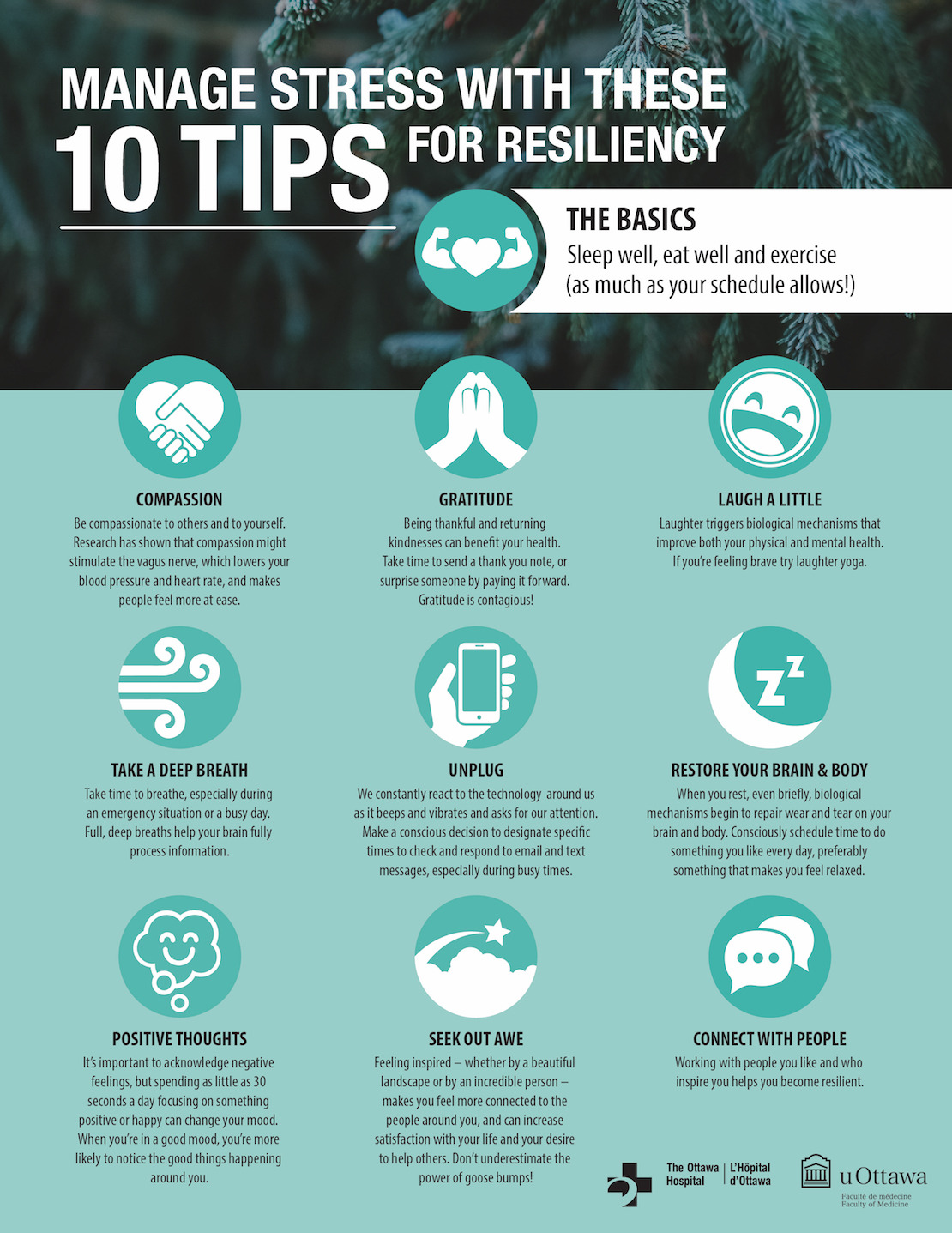The last few weeks of December are often the busiest. Whether you’re trying to finish up projects before the new year or preparing for the holidays, it can be a very stressful time.
To help their colleagues manage stress, Drs. Caroline Gérin-Lajoie and Kerri Ritchie promote resiliency at the University of Ottawa and The Ottawa Hospital (TOH).
“A stressful day, at work or in your personal life, can leave you feeling drained and frustrated,” says Dr. Gérin-Lajoie, assistant professor in the Department of Psychiatry and outgoing director of the Faculty of Medicine Wellness Program. Dr. Gérin-Lajoie also acts as the Director of Physician Engagement, Health, and Wellness at TOH. “Resiliency helps you bounce back and thrive despite adversity.”
“The secret is to practice resiliency regularly,” says Dr. Kerri Ritchie, a psychologist and professional practice coordinator of psychology at TOH, and clinical professor in the School of Psychology at the University of Ottawa. “Practicing these skills every day will make it easier for you to handle emergencies and stress when they happen.”
While these tips may serve you well over the holiday season, they are also great candidates for New Year’s resolutions. To help motivate you to incorporate these healthy habits into your life, we’ve created this printout for you to post next to your desk, on your office bulletin board, or somewhere in your home (so your family can participate too!)
Manage your stress with these 10 tips for resiliency
- The basics. Sleep well, eat well and exercise (as much as your schedule allows!).
- Compassion. Be compassionate to others and to yourself. Research has shown that compassion might stimulate the vagus nerve, which lowers your blood pressure and heart rate and makes people feel more at ease.
- Gratitude. Being thankful and returning kindnesses can benefit your health. Take time to send a thank you note, or surprise someone by paying it forward. Gratitude is contagious!
- Laugh a little. Laughter triggers biological mechanisms that improve both your physical and mental health. If you’re feeling brave, Dr. Gérin-Lajoie recommends trying laughter yoga.
- Take a deep breath. Take time to breathe, especially during an emergency situation or a busy day. Full, deep breaths help your brain fully process information.
- Unplug. We constantly react to the technology around us as it beeps and vibrates and asks for our attention. Make a conscious decision to designate specific times to check and respond to email and text messages, especially during busy times.
- Restore your brain and body. When you rest, even briefly, biological mechanisms begin to repair wear and tear on your brain and body. Consciously schedule time to do something you like every day, preferably something that makes you feel relaxed.
- Positive thoughts. It’s important to acknowledge negative feelings, but spending as little as 30 seconds a day focusing on something positive or happy can change your mood. When you’re in a good mood, you’re more likely to notice the good things happening around you.
- Seek out awe. Feeling inspired – whether by a beautiful landscape or by an incredible person – makes you feel more connected to the people around you, and can increase satisfaction with your life and your desire to help others. Don’t underestimate the power of goosebumps!
- Connect with people. Working with people you like and who inspire you helps y ou become resilient .

University of Ottawa Faculty of Medicine Wellness services:
The Faculty Wellness Program offers a variety of services and resources to support learners and faculty members, including appointments with a full-time psychologist, the Code 99 program for quickly finding a family physician, and links to support services across the University and beyond, including counselling and coaching for students, the PARO 24 Hour Helpline, and the Ontario Medical Association Physician Health Program. University of Ottawa support staff can access the employee assistance program (Shepell). Anyone with a uOttawa.ca email address can access the Therapy Assisted Online.
This list was first published by the Ottawa Hospital in March, 2017.

